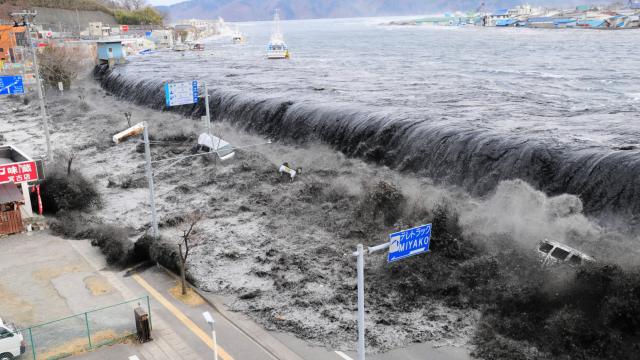The Tokyo District Court has acquitted three former Tokyo Electric Power Company executives charged with criminal negligence leading to the 2011 Fukushima nuclear disaster.
On Thursday, the Japanese court ruled that ex-TEPCO chairman Tsunehisa Katsumata, along with former vice-presidents Ichiro Takekuro and Sakae Muto, were not criminally responsible for deaths and injuries caused by the nuclear disaster, reports The Japan Times.
The unprecedented triple disaster started on 11 March 2011, when a magnitude 9.0 earthquake struck off the east coast of Japan. The quake spawned a devastating tsunami with waves reaching as high as 15.5m.
The tsunami struck the Fukushima nuclear power plant along the northeastern coast, knocking out cooling systems at three reactors and damaging other parts of the facility. Then ensuing meltdowns forced the evacuation of hundreds of thousands of residents, while contaminating a large swath of Fukushima prefecture. It was the worst nuclear disaster since Chernobyl in 1986.
The Associated Press reports that prosecuting attorneys were asking that each of the three TEPCO executives receive five-year prison sentences, saying they failed to predict the scale of the tsunami and for failing to implement the required countermeasures to protect the plant, such as building a seawall of sufficient height.
By failing to do so, prosecutors argued, the executives were professionally negligent, leading to the disaster and the required evacuations. Katsumata, Takekuro and Muto were also accused of being criminally responsible for the deaths of 44 elderly patients who had to be evacuated from a nearby hospital.
All three men plead not guilty to the charges, contending that the unusually large size of the tsunami was unforeseeable and that any protective measures, had they been implemented, would’ve been futile anyway, according to The Japan Times. The trial, which started in June 2017, finally ended on Thursday with the not guilty verdict.
In its closing statements, the court said it wasn’t reasonable for the executives to predict the severity of tsunamis, in stark contradiction to what the prosecuting attorneys had argued. The Japan Times reports that the prosecutors presented upsetting evidence suggesting the TEPCO executives were given the heads-up by scientists three years before the disaster:
A Tepco internal study, based on a 2002 report by a government panel, concluded that a wave of up to 15.7 meters could hit after a magnitude 8.3 quake and thus would surpass the 10-metre elevation of the site where major facilities were located. The findings were reported to Tepco executives including Muto in June 2008, according to a written statement from a former Tepco executive. That executive claimed that his boss abruptly postponed tsunami prevention measures at the Fukushima No. 1 plant in 2008. The statement was read during a court hearing.
The judge in the case, Kenichi Nagafuchi, read the evidence differently, saying the scientific community hadn’t reached consensus about the potential size of tsunamis, while adding that closing the plant to install protective measures would’ve had a detrimental “social impact”, the AP reports.
This brings the only criminal trial linked to the Fukushima disaster to a close, but the AP reports that prosecutors will likely launch an appeal.
An attorney with the prosecuting team, Shozaburo Ishida, made his displeasure known about the verdict saying the “judges favoured the government’s stance on nuclear power”, while criticising the “court’s rationale that nuclear power companies are not required to ensure complete safety”.
Indeed, this appears to be far from over for the TEPCO trio. Approximately 30 civil lawsuits involving over 10,000 evacuees are still in effect, according to The Japan Times. The outcomes of these pending trials are unclear despite this recent ruling, due to several district courts in Japan having ruled that TEPCO had it within their means to predict and prevent the nuclear disaster.
What’s more, governmental and parliamentary inquiries concluded that “TEPCO’s lack of a safety culture and weak risk management, including an underestimation of the tsunami risks, led to the disaster,” and that “TEPCO colluded with regulators to disregard tsunami protection measures,” the AP reports.
[referenced url=”https://gizmodo.com.au/2019/02/remote-controlled-probe-picks-up-radioactive-debris-at-fukushima-for-the-first-time/” thumb=”https://i.kinja-img.com/gawker-media/image/upload/t_ku-large/gglte60hgzc9fcz9gdhz.jpg” title=”Remote-Controlled Probe Picks Up Radioactive Debris At Fukushima For The First Time” excerpt=”Tepco, the state-owned operator of the badly damaged Fukushima nuclear plant, has conducted an important test in which a remote-controlled probe managed to grasp several small grains of radioactive debris, AFP reports. The successful operation marked an important achievement for the company as it prepares for a cleanup operation that could take decades.”]
Meanwhile, clean-up at the beleaguered plant continues. TECPO says the plant won’t be completely decommissioned until the 2050s. Given this timeline and the pending trials, it’s still going to be a while before Japan can finally close this sad chapter of its history.
